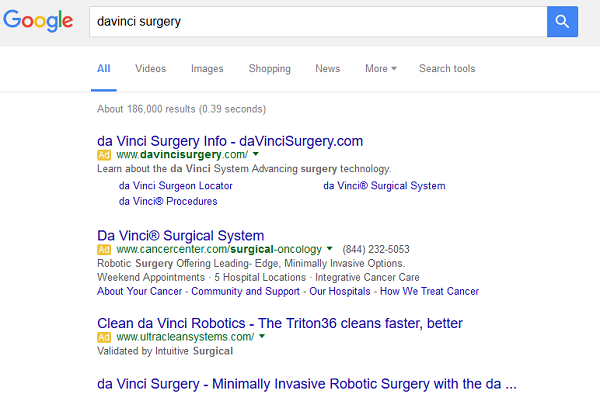Your cart is currently empty!

Optimizing for Google Ads
Google Ads are pay per click marketing at its finest: your ads show up only to people who are actively looking for what you have to offer. These are the ads you see when you’re using Google’s search engine, as shown above. If you look for information about daVinci assisted surgery, you’ll often be shown ads at the top of the search engine results page, so that you can go immediately to a facility that can help you with this type of surgery.
As an advertiser, you’ll pay only if someone clicks through the ad to your website. The cost of each click can vary quite a bit based on a number of factors. So when one of our clients contacted us with a wish to decrease his cost per click, we had a number of suggestions.
Are you configuring your ads correctly?
Setting up Google Ads isn’t very difficult, in the sense that it doesn’t require lots of technical knowledge or coding skill. But it definitely requires skills, knowledge, and experience. As a Google Partner agency, we’re required to maintain our certifications and keep up with all the details and the changes in the system, so we’re aware of the complications. You can try DIY, but you’ll probably get better ROI if you work with a Google Partner.
A few things to think about:
- Are you talking to the right people? If you’re offering medical spa services, you’re not likely to draw customers from both coasts. People have to be physically present to receive your services, so you’re better off targeting people within a reasonable driving distance.
- Are you choosing the right keywords? Few people are googling “ compared with those who look for “hair loss treatments.” Remember to think about it from the consumer’s point of view. On the other hand, people searching for hair loss solutions may be thinking about their dog’s mange or their mom’s alopecia — use negative keyword choices to narrow the focus so you don’t pay for people who aren’t really your customers.
- Are you organizing your campaigns in a useful way? If you have one ad and one keyword, you’ll be missing opportunities. On the other hand, if you have hundreds of ads and hundreds of keywords in a single campaign, it will be hard to see what’s working and what’s not. You can also end up competing against yourself! Make sure that you group ads into logical divisions.
How is your landing page?
The quality of the web page you’re sending visitors to is key for effective cost-per-click ad campaigns. First, make sure you’re linking to the right page — and that’s almost never your homepage. If you’re using the keyword “laser hair removal,” then your landing page has to give your visitors an easy path to purchase for laser hair removal. They don’t want to be offered a whole range of things from tattoo removal to dermabrasion.
Then make sure that the page is the best you can offer. Slow loading, outdated code, or poor writing will make your Ads cost rise and your conversions fall.
The landing page is usually our first stop. For the client who wanted his costs trimmed, we created 16 new product pages and updated several more. The client’s paid search visits increased by 75% within two weeks without increasing his costs.
Are your ad and landing page relevant to your keywords?
One of the most important factors for CPC is relevance — that is, how closely related the ad is to the landing page and to the keyword you’ve specified.
If your keyword is “mammogram” and you send visitors to a page on women’s health or the homepage of your imaging services website, you’re not providing a good experience for that visitor. If you’re offering digital tomosynthesis, “mammogram” might still be a good keyword for you, but you’ll want to make sure that your ad and your landing page both clearly communicate your services to avoid confusion.
With print ads, you might focus on branding or try to come up with a clever headline. That’s not effective for paid search. Clarity and relevance are what you need.
Who’s your competition?
Every time you google something and see ads, it’s because your search triggered a super-fast auction. Advertisers compete on the basis of the quality of their landing page, the relevance of their ad and page to the keyword, and also on how much they’re willing to pay. Depending on your competitors, a particular keyword might cost 31 cents each time someone clicks through — or $31.00 a click.
Find out who your competitors are by googling, using the Auction Insights report at your Google Ads dashboard (the most accurate, but you need to have a fair amount of activity to see the data), or using tools like Spyfu. Then visit your competitors’ websites.
For one bio research company, we quickly saw that their top competitors were much larger than they and had much deeper pockets. They had established websites with lots of information and a clear path to purchase for people all over the country. We recommended that our client back off on the broad keywords they wanted to work on and focus on long-tail or regional terms instead. There’s no point in jousting at windmills when you can compete successfully if you change your approach.
Optimizing for Google Ads is not exactly the same as optimizing for organic search, but it’s still about quality and relevance, not just about outbidding your competitor.
by
Tags:
Comments
One response to “Optimizing for Google Ads”
Very useful content. Thank you for sharing

Leave a Reply